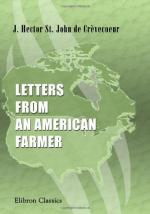whether he has any at all? He is a good farmer,
he is a sober, peaceable, good citizen: William
Penn himself would not wish for more. This is
the visible character, the invisible one is only guessed
at, and is nobody’s business. Next again
lives a Low Dutchman, who implicitly believes the rules
laid down by the synod of Dort. He conceives
no other idea of a clergyman than that of an hired
man; if he does his work well he will pay him the
stipulated sum; if not he will dismiss him, and do
without his sermons, and let his church be shut up
for years. But notwithstanding this coarse idea,
you will find his house and farm to be the neatest
in all the country; and you will judge by his waggon
and fat horses, that he thinks more of the affairs
of this world than of those of the next. He is
sober and laborious, therefore he is all he ought
to be as to the affairs of this life; as for those
of the next, he must trust to the great Creator.
Each of these people instruct their children as well
as they can, but these instructions are feeble compared
to those which are given to the youth of the poorest
class in Europe. Their children will therefore
grow up less zealous and more indifferent in matters
of religion than their parents. The foolish vanity,
or rather the fury of making Proselytes, is unknown
here; they have no time, the seasons call for all
their attention, and thus in a few years, this mixed
neighbourhood will exhibit a strange religious medley,
that will be neither pure Catholicism nor pure Calvinism.
A very perceptible indifference even in the first
generation, will become apparent; and it may happen
that the daughter of the Catholic will marry the son
of the seceder, and settle by themselves at a distance
from their parents. What religious education will
they give their children? A very imperfect one.
If there happens to be in the neighbourhood any place
of worship, we will suppose a Quaker’s meeting;
rather than not show their fine clothes, they will
go to it, and some of them may perhaps attach themselves
to that society. Others will remain in a perfect
state of indifference; the children of these zealous
parents will not be able to tell what their religious
principles are, and their grandchildren still less.
The neighbourhood of a place of worship generally
leads them to it, and the action of going thither,
is the strongest evidence they can give of their attachment
to any sect. The Quakers are the only people who
retain a fondness for their own mode of worship; for
be they ever so far separated from each other, they
hold a sort of communion with the society, and seldom
depart from its rules, at least in this country.
Thus all sects are mixed as well as all nations; thus
religious indifference is imperceptibly disseminated
from one end of the continent to the other; which
is at present one of the strongest characteristics
of the Americans. Where this will reach no one
can tell, perhaps it may leave a vacuum fit to receive
other systems. Persecution, religious pride,
the love of contradiction, are the food of what the
world commonly calls religion. These motives have
ceased here; zeal in Europe is confined; here it evaporates
in the great distance it has to travel; there it is
a grain of powder inclosed, here it burns away in
the open air, and consumes without effect.




